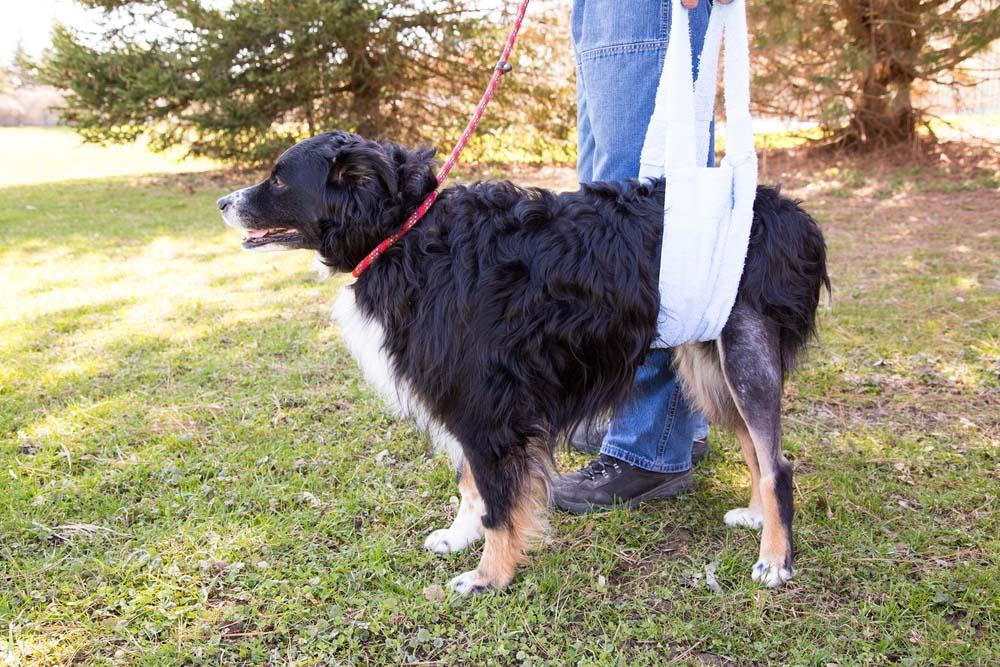Hip Dysplasia Warnings

- posted: Jan. 23, 2020
Hip Dysplasia: Warning Signs to Look for in your Pet
According to the American Kennel Club, hip dysplasia is one of the most common skeletal conditions in large breed dogs. It happens when the ball and socket of the hip joint do not fit properly, thereby failing to work together. Here are some signs our veterinarian in Laguna Hills would like you to watch out for.
Signs of Hip Dysplasia
One of the first signs an animal exhibits is decreased activity. That's because the discomfort associated with hip dysplasia can leave your canine unwilling to play. A limited range in motion might also make running or jumping more difficult.
This condition is most often noticed in the hind legs. Accordingly, you may notice your dog limping on his hindquarters or developing what appears to be a “bunny hop.” Eventually, there can be a loss of muscle mass in the back legs along with more developed front legs to compensate.
Hip dysplasia in dogs is similar to osteoarthritis in humans. As such, your pet may exhibit pain, stiffness, and swelling in the hip joints.
Veterinary Treatment
To confirm a diagnosis, our veterinarian will perform a physical exam to check the condition of your dog’s hip joints. We’ll check for looseness in the joint as well as grinding, creaking, or crackling. If an injury is suspected, we may also recommend x-rays to rule out any other problems such as broken bones.
Hip dysplasia can often be treated with anti-inflammatory medications or corticosteroids. More advanced cases could require surgery and an overnight stay in our pet hospital. However, this is rarely necessary as most conditions are manageable if you control your dog’s weight and maintain a moderate exercise routine.
Call Trinity Pet Hospital!
Although it is more common among larger dogs, smaller breeds may develop hip dysplasia as well. Watch for signs that this is developing, and then contact Trinity Pet Hospital if you do notice any.

- posted: Jan. 23, 2020
Hip Dysplasia: Warning Signs to Look for in your Pet
According to the American Kennel Club, hip dysplasia is one of the most common skeletal conditions in large breed dogs. It happens when the ball and socket of the hip joint do not fit properly, thereby failing to work together. Here are some signs our veterinarian in Laguna Hills would like you to watch out for.
Signs of Hip Dysplasia
One of the first signs an animal exhibits is decreased activity. That's because the discomfort associated with hip dysplasia can leave your canine unwilling to play. A limited range in motion might also make running or jumping more difficult.
This condition is most often noticed in the hind legs. Accordingly, you may notice your dog limping on his hindquarters or developing what appears to be a “bunny hop.” Eventually, there can be a loss of muscle mass in the back legs along with more developed front legs to compensate.
Hip dysplasia in dogs is similar to osteoarthritis in humans. As such, your pet may exhibit pain, stiffness, and swelling in the hip joints.
Veterinary Treatment
To confirm a diagnosis, our veterinarian will perform a physical exam to check the condition of your dog’s hip joints. We’ll check for looseness in the joint as well as grinding, creaking, or crackling. If an injury is suspected, we may also recommend x-rays to rule out any other problems such as broken bones.
Hip dysplasia can often be treated with anti-inflammatory medications or corticosteroids. More advanced cases could require surgery and an overnight stay in our pet hospital. However, this is rarely necessary as most conditions are manageable if you control your dog’s weight and maintain a moderate exercise routine.
Call Trinity Pet Hospital!
Although it is more common among larger dogs, smaller breeds may develop hip dysplasia as well. Watch for signs that this is developing, and then contact Trinity Pet Hospital if you do notice any.
Location and Hours
24861 Alicia Pkwy, Laguna Hills, CA 92653
Monday
7:00 am - 6:00 pm
Tuesday
7:00 am - 6:00 pm
Wednesday
7:00 am - 6:00 pm
Thursday
7:00 am - 6:00 pm
Friday
7:00 am - 6:00 pm
Saturday
8:00 am - 3:00 pm
Sunday
Closed
